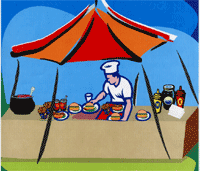INTRODUCTION
The popularity of fairs, street festivals, and community suppers in America’s small town and big cities continues to grow. We love to share our diverse cultures and cuisines with others in the community. These events may be held at fairgrounds, on city streets, or in a church–often with limited food preparation and sanitary facilities. Food is served by volunteers who may not have the food safety knowledge and skills needed to prepare food safely.
Organizations serving food at these events have an obligation by law, to provide safe food to the public. The consequences of a foodborne illness outbreak at these types of events could be devastating personally and financially to any organization- either non-profit or for- profit. This curriculum was designed to help you and your organization reduce the chance that a foodborne illness outbreak will ruin your event.
The materials are based on a Pre-Operational Guide for Temporary Food Establishments developed by the Plan Review Committee of the Conference for Food Protection and adopted by the Food and Drug Administration in 2000. A copy of these guidelines may be found on the FDA website:
http://www.fda.gov/food/guidanceregulation/retailfoodprotection/default.htm
Training materials include:
1. The Planning Guide and Food Safety Plan Template which is designed to assist an organization in operating the event in a manner that reduces the risk of foodborne illness for patrons; and to comply with local/state food safety regulations. The Planning Guide is contains food safety information and a variety of forms that can be used for planning the event and for food safety practices record-keeping.
2. A series of short Toolbox Lessons that may be used to train site coordinators and/or food workers. The lessons are based on the basic food safety principles of the nationally recognized “Fight BAC” campaign. Each Toolbox includes links to websites offering additional information. The following toolbox lessons can be downloaded in PDF format:
- Keep It Clean Series:
Hand-washing
Food Contact Surfaces: work areas, equipment, utensils, cutting boards - Separate-Don’t Contaminate Series:
Menu Planning and Purchasing
Receiving Safe Food
Storing Food Safely
Serving Safe Food
3. A worker training booklet, “Five Steps to Food Safety,” that includes the information presented in the toolboxes.
4. A power point presentation designed to be used with volunteer foodservice workers. The presentation includes information on current outbreaks at temporary food events, cause and prevention of foodborne illness, their responsibilities in planning and conducting a food event that is “safe”, a review of the contents of the Planning Guide and Food Safety Template.
Curriculum Authors:
| University of Rhode Island Martha S. Patnoad, MS CP-FS Cooperative Extension Professor and Specialist Food Safety Education CE Education Center 3 East Alumni Ave. University of Rhode Island Kingston, RI 02881 Tel: 401-874-2960 Fax: 401-874-2259 mpatnoad@uri.edu |
University of Connecticut Diane Wright Hirsch, MPH, RD Cooperative Extension Educator/Food Safety University of Connecticut New Haven County Extension Center 305 Skiff Street North Haven, CT 06473 Phone: (203)407-3163 Fax: (203)407-3176 dhirsch@canr.uconn.edu |
 Home
Home Browse
Browse Close
Close Events
Events Maps
Maps Email
Email Brightspace
Brightspace eCampus
eCampus


